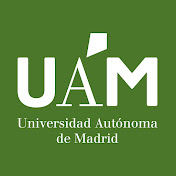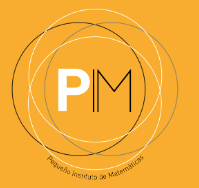Investigación
Noticias Destacadas
 Agenda del Departamento Agenda del Departamento |
- Información (provisional) sobre grupos y horarios de las asignaturas impartidas por el Departamento de Matemáticas, para el curso 2023-2024.
- Propuestas de Trabajos de Fin de Grado para el curso 2023-2024.
|
Canal @matematicasuamEnlace al canal del Departamento en youtube. |
PIM (Pequeño Instituto de Matemáticas)Con el objetivo de fomentar el interés por las matemáticas y dirigido a jóvenes entre 14 y 18 años, nace este proyecto de Instituto de Ciencias Matemáticas (ICMAT) en colaboración con nuestro Departamento, la Universidad Autónoma de Madrid y la Real Sociedad Matemática Española. El proyecto comienzó en el curso académico 2022-2023. Ampliar información en su página web. |
Seminario Teoría de Grupos UAM-ICMAT
Jueves 25 Abril, 11:30, Aula 520, UAM
Speaker:Lleonard Rubio Degrassi (Universidad Murcia)
Title: On the solvability and the simplicity of the first Hochschild cohomology
Abstract:
Let $A$ be a finite dimensional algebra over an algebraically closed field. By a famous theorem of Gabriel, $A$ is Morita equivalent to a path algebra of a quiver, modulo an (admissible) ideal. The quiver (also called $mathrm{Ext}$-quiver) encodes homological information of the algebra in a combinatorial way. The vertices correspond to the isoclasses of simple $A$-modules, and the dimension of the extensions between two simple modules is given by the number of arrows between two vertices.
Hochschild cohomology records crucial information about $A$: its first degree component, denoted by $mathrm{HH}^1(A)$, is a Lie algebra and it is invariant under Morita and derived equivalences. For symmetric algebras, it is also invariant under stable equivalences of Morita type. Although $mathrm{HH}^1$ is a powerful invariant, its Lie structure has been calculated only for few families of algebras.
In this talk I will show how the Lie structure of $mathrm{HH}^1$ is strongly related with the $mathrm{Ext}$-quiver of $A$. More precisely, if we assume that the $mathrm{Ext}$-quiver of $A$ is a simple directed graph, then $mathrm{HH}^1(A)$ is a solvable Lie algebra. I will also show that in the case of having at most two parallel arrows in the same direction in the $mathrm{Ext}$-quiver of $A$ but no loops, the only simple Lie algebra that could arise is $mathrm{sl}_2(k)$. For quivers containing loops, I will determine sufficient conditions for the solvability of $HH^1$. Finally, I will apply these criteria to show the solvability of the first Hochschild cohomology of blocks with cyclic defect, tame blocks and some wild algebras.






